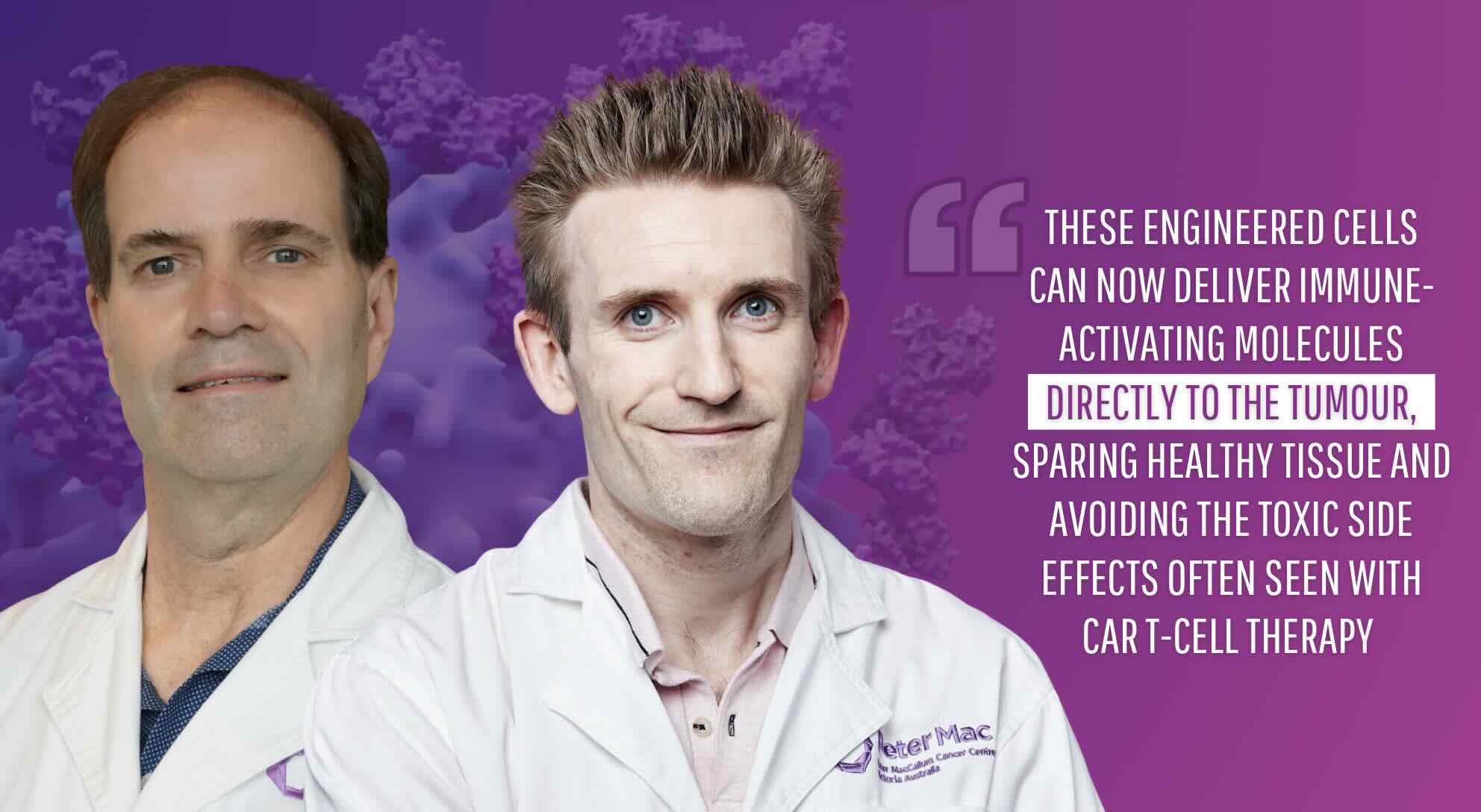Finding a way to fight solid tumour cancers with CAR T-cell therapy
03 July 2025

Peter Mac researchers have used genetic engineering to activate cancer-fighting immune proteins only where they are needed – at the tumour site – offering a powerful new way to treat solid cancers with CAR T-cell therapy.
Up to this point, CAR T-cell therapy has shown effectiveness against blood-based cancers and not cancers that involve solid tumours.
Using the gene editing tool CRISPR*, the Peter Mac team has engineered CAR T-cells to release special signalling proteins called cytokines, that boost the immune response, but only at the tumour site.
This is achieved by harnessing natural ‘on switches’ called promoters, from genes that are only active in cancerous tissue.
Associate Professor Paul Beavis explained that they have effectively programmed these cancer-fighting immune cells to become smart responders, which they’ve given the name “Precision Guided Munition (PGM) CAR T-cells”.
“These engineered cells can now deliver immune-activating molecules directly to the tumour, sparing healthy tissue and avoiding the toxic side effects often seen with CAR T-cell therapy,” Associate Professor Beavis said.
“We identified two key promoters, which are active in CAR T-cells primarily in tumours. By using CRISPR we can insert genes for powerful cytokines such as IL-12 and IL-2 under the control of these promoters, which resulted in a localised and potent immune response against cancer.
“We tested this new technique in multiple cancer models such as breast, colon and ovarian cancer and the results were incredibly promising with cure rates close to 100 percent.”
A paper describing this CRISPR modification process has just published in the journal Nature. Read the Nature paper “Rewiring endogenous genes in CAR T-cells for tumour-restricted payload delivery”.
Professor Phil Darcy, who co-led the study, said that they benchmarked this new approach against standard approaches that are used to activate CAR T-cells.
“As the system we have developed allows for the immune response to be localised to the tumour microenvironment we see less toxicity which should result in a safer treatment,” he said.
“In animal models, this targeted strategy led to improved tumour control and long-term survival, even in models where human cancers were introduced.”
The team is now exploring opportunities to stage a first in human trial of PGM CAR T-cell therapy in multiple myeloma and/or solid tumours.
This research made possible via funding support from Cancer Research Institute, the National Health and Medical Research Council (NHMRC) and the National Breast Cancer Foundation (NBCF).
“CAR T-cell therapy has already transformed outcomes for some blood cancers, and this exciting discovery by Associate Professor Paul Beavis and the team at the Peter MacCallum Cancer Centre represents a significant step forward in making CAR T-cell therapy safer and more effective for solid tumours, like breast cancer,” said Dr Julie Ince-Demetriou, Executive Director, Research at NBCF.
“With breast cancer remaining the fifth leading cause of cancer death in Australia, this promising discovery will provide hope to many people and is aligned with the National Breast Cancer Foundation’s vision of Zero Deaths from breast cancer.”
A related paper, also co-authored by Professor Darcy and Associate Professor Beavis, which examines another aspect of improving CAR T-cell effectiveness in solid tumours, also published in Nature Communications this week.
Read the Nature Communications paper “Tumor site-directed A1R expression enhances CAR T cell function and improves efficacy against solid tumors”.
Contact
Media can contact the Peter Mac Communications team on 0417 123 048 for interviews and more information.
* About CRISPR
Clustered regularly interspaced short palindromic repeats (CRISPR) is a genetic engineering tool that is used to cut DNA like a pair of scissors to remove or add new DNA.
